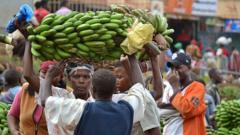In a significant escalation of trade disputes, Tanzania has implemented a ban on all agricultural imports from South Africa and Malawi, affecting the flow of goods across borders. This decision, confirmed by Agriculture Minister Hussein Bashe, is seen as a measure to safeguard Tanzania's business interests amidst long-standing grievances over trade imbalances between the three countries.
**Tanzania Halts Agricultural Imports from South Africa and Malawi Amid Trade Tensions**

**Tanzania Halts Agricultural Imports from South Africa and Malawi Amid Trade Tensions**
Tanzania's Agriculture Minister announces a ban on imports from South Africa and Malawi, escalating trade disputes in the region.
Tanzania's drastic move follows years of restrictive trade practices imposed by South Africa on Tanzanian bananas, alongside Malawi's earlier import bans on essential goods from Tanzania including flour, rice, and maize. The Tanzanian government continues to seek dialogue with its neighbors to address these issues, while also affirming its commitment to protect local traders and food security. Notably, the bans are already impacting trade dynamics among the Southern African Development Community (SADC) nations, highlighting the fragile nature of regional economics.
Minister Bashe emphasized that despite these restrictions, there would be no risk to food security in Tanzania. The repercussions of these actions are likely to be felt most significantly by Malawi, whose reliance on Tanzanian ports for exporting goods like tobacco and sugar may necessitate potentially costlier shipping routes through neighboring Mozambique. The ongoing feud signifies a critical juncture for trade relations in the region as all involved parties navigate their economic futures.
Minister Bashe emphasized that despite these restrictions, there would be no risk to food security in Tanzania. The repercussions of these actions are likely to be felt most significantly by Malawi, whose reliance on Tanzanian ports for exporting goods like tobacco and sugar may necessitate potentially costlier shipping routes through neighboring Mozambique. The ongoing feud signifies a critical juncture for trade relations in the region as all involved parties navigate their economic futures.

















